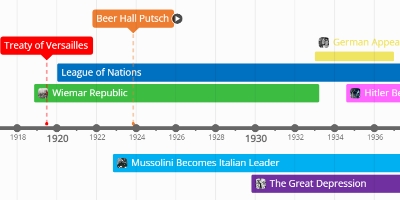Wiemar Republic (9 nov 1918 ano – 23 mar 1933 ano)
Descrição:
Causes:1. WW1 left Germany falling apart due to economic failure caused by the Treaty of Versailles
2. The Treaty of Versailles had harsh penalties on Germany
3. Political instability due to involvement in WW1
4. Social upheaval, citizens gained awareness of rights such as working rights and voting rights
Effects:
1. Two representatives of the Weimar Republic were forced to sign the Treaty of Versailles after WW1, leading to resentment from a large portion of Germany
2. Democracy was formed and elections for the parliament and president took place every four years. All Germans over 20 were able to vote
3. The Reichstag became powerful and had many more powers due to loss of military
4. A bill of rights meant every German citizen has freedoms of speech, religion, and equality.
5. Each party got the same amounts of chairs in parliament as they did percentage of votes in an election, leading to difficulty in passing laws and unstable governments
6. Article 48 gave the president the power to overrule the parliament and act without consulting any parliament officials in an emergency, however “emergency” was not defined and this led to overuse of the rule.
7. Article 48 led to weakened trust in democracy and overall, the ruling of a non-democratic party (Nazi Party)
8. The post-WW1 communist party, Spartacists, rebelled in Berlin, and were defeated by the army the Freikorps
9. Due to the signing of the Treaty of Versailles the Freikorps had to be disbanded, leaving the government vulnerable
10. The Germans missed a reparations payment in 1922, this lead to a hyperinflation crisis within Germany in 1923
11. Rights of citizens were gained, wages went up, living conditions improved, however, there were major increases in the cost of living
Adicionado na linha do tempo:
Data:
9 nov 1918 ano
23 mar 1933 ano
~ 14 years
